Grant: I’m going to need to break this response down into several components because there’s a lot to unpack here.
Response # 1 - This Criticism Does Not Accurately Identify Elincia’s Character Arc
In Path of Radiance we see Elincia transition from a helpless, sheltered princess into a confident ruler. Claiming that her arc is about “no longer having someone else do the fighting for her” or “fighting on her own terms” doesn’t make sense. She had to rely on The Greil Mercenaries, Gallia and Begnion to do all the fighting for her for the entire game. Elincia never “fought on her own terms” in Path of Radiance. Someone else was always doing the fighting for her.
A more accurate interpretation of her character arc would go along the lines of this: “Elincia’s character is about her growing into a strong, confident leader. A major characteristic of this is how her leadership abilities are forged by trial and tribulation.” Something that Radiant Dawn, and Part 2 in particular, does very well is expand on this. We see Elincia become a leader who’s far bolder than before and willing to make the hard calls when she needs to.
Response # 2 - Ike Does Not Bail Elincia Out
Ludveck had already been beaten and was in jail by the time Ike showed up to help. Elincia held out when Ludveck besieged her castle and the Crimean Royal Knights defeated Ludveck’s rebel forces. The whole reason why Lucia was in peril in the first place was because the Crimean rebels were trying to free Ludveck. The whole point was that if Elincia didn’t free him they’d kill Lucia.
Elincia was never in peril and didn’t need saving. She already won. Not only that, but the rebel plan of holding Lucia hostage wasn’t going to work either. So the rebels failed all before Ike had his big moment. It feels more like Ike just cleaned house after Elincia did the hard part. Braden summed it up really well in a conversation we had prior to me writing my response:
“Ike showing up was basically Bastian appearing with reinforcements and trumping Ludveck's trump card”
Response # 3 - Elincia’s Character Growth Is Not Dependent on Whether Lucia Lives or Dies
The big Elincia moment at the end of Part 2 is when she refuses to free Ludveck. She knew what was at stake when she made that decision. She didn’t know that Bastian had hired the Greil Mercenaries so she thought Lucia was going to die. And Elincia still made the choice. That for me is indicative of her character growth. She made the right choice, even if it was super hard for her on a personal level. In case this wasn’t made clear enough Part 3 gives us another moment like this when she declares Crimea’s neutrality in the war between Begnion and the Laguz Alliance. In case this hadn’t been made clear enough we see Elincia do this again in Part 3 when she lays down her sword in the middle of a battlefield refusing to fight for either Begnion or the Laguz Alliance.
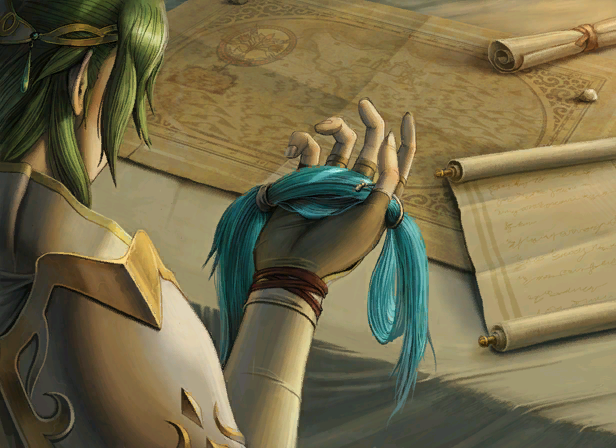
Marm: No character ever needs to die, and an author that tells you otherwise hasn’t mastered their craft yet. Character deaths can be interesting. They can be unexpected, make you feel terrible or oddly satisfied. There’s no question that they are incredibly useful and versatile narrative tools. But they are not necessary, and this is especially true when it comes to playable characters-- especially in games like Fire Emblem.
Why? Let’s ignore the story ramifications for now. Killing off a playable character has meta consequences in a video game that go beyond the loss of a narrative role. The death of a playable character means losing access to the use of said character.
This is not always a problem-- in some games, characters do not play differently from one another, or another can come along to replace the lost party member with identical (or near identical) skills. In that sense, you can replace what you’ve lost. You could make a case that Fire Emblem Radiant Dawn gives you plenty of Swordmasters to compensate, even. And you still wouldn’t be right.
See, the difference between most of those games and Fire Emblem Radiant Dawn is two fold. One is that this game is at its core about managing resources. In other words, you are given limited resources to spend, and it is your job to distribute them wisely. Effectively, the narrative death of this playable character implies some players will be unjustly and arbitrarily punished for investing resources into Lucia, which would directly lead to a worse experience and, thus, a worse game. (Incidentally, this is an [avoidable] offense in Fates, where you can lose Kaze for some reason).
Moreover, most other games allow you to grind, which is not a feature present in Fire Emblem Radiant Dawn (not by any conventional means, at least), which effectively means that there’s no efficient method to recover lost resources. Which brings me to point 2.

Character death in Fire Emblem is meant to be a punitive incentive. It is supposed to be a consequence resulting from the player’s poor plays (or poor luck). Killing off playable characters within the story trivializes this essential aspect of the Fire Emblem experience.
But enough with the gameplay ramifications and back to the narrative.
Character (and personal) growth is not something that disappears. Let’s work with an analogy here. It’s about to get dark and real for a bit.
There is a woman named Jennifer. Jennifer’s sister is deathly ill, and is undergoing a risky surgery at the hospital soon. Jennifer cannot imagine living without her sister, and suicidal thoughts start popping into her mind. What if she doesn’t survive the operation? She couldn’t take it. There’s no way she’d take it. She doesn’t even want to imagine life without her.
Then comes the day of the surgery. After many excruciating hours, the doctor comes in and informs the family that Jennifer’s sister didn’t make it. Her world goes dark. Immediately she thinks of killing herself-- she had thought of many ways to do it within the past week.
But then she sees her parents, devastated. They need her. How could she even think about leaving them all alone?
Jennifer gains the resolve to live through adversity and be there for the people she loves, even if it means living hurts. It happens, all of it, within an instant.
And then, a dozen or so minutes later, the nurse comes in. A miracle has occurred and the sister woke up. The surgery was a success after all.
Does her sister’s survival invalidate her experience? In the span of minutes, she experienced grief, wishing for death, remorse and then found new resolve for marching on through life.
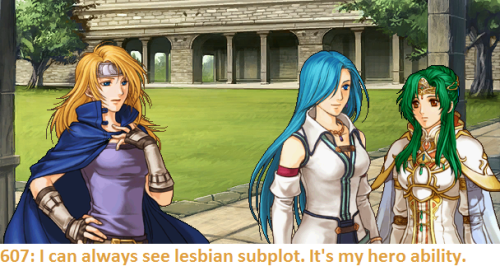
This one incident changed her, regardless of her sister’s survival. The way she’ll live and look at life will never be the same after this.
That’s basically what happened to Elincia. She avoided doing so for the longest time, but forced to make a choice, she decided that Crimea was more important to her than Lucia, the person closest to her. This isn’t a decision she can take back. Her relationship with her retainers, and Lucia especially, will forever be changed. She’s accepted the fact now that she is responsible for their lives. There may come a time when she has to ask one of them to die for her. And it’s established between them that, should she ask, they will comply. Lucia would have died for Elincia, and as much as Elincia hates it, henceforward it’s an option she must always consider. It’s an event that changes Elincia’s character to its core; she’s still a pacifist, deep down, but she loses her young naivetée in that she recognizes now that she must administer death if she wants to protect the things she cares for; the death of the rebels. Ludveck and his cohorts must be put to the sword, and she will have the army carry this out in official capacity.
It is in that moment that Elincia truly became the Queen of Crimea. That she accepted the full weight of her responsibilities.
As far as fighting her own battles go, this is actually an extension of her PoR story arc. Elincia is not meant to be fighting her battles on the frontline, she’s meant to be fighting them on the political stage. While one is not exclusive of the other, it does imply that she must learn to direct and lead her military assets in a way that brings victory to her nation. To an extent, Elincia becomes Crimea, and all her people’s exploits are her own. Her personal conflict sees her range of influence and responsibility grow along with her. Just herself until Ike finds her, then it extends to the greil mercenaries, the Crimean liberation army and, finally, the very nation of Crimea itself. Her battles are Crimea’s battles, not just her own. So, really, Ike didn’t save Lucia. Bastian did, by hiring them. But Bastian did so in the name of his Queen, Elincia, and so Elincia saved Lucia. That’s what it means to take responsibility for your subjects’ actions. It also means that Elincia was responsible for Ludveck’s revolt. She was responsible for Lucia’s capture. It all comes back to her. That’s what it means to lead a nation.

Evil Overlord Darius Pent: Elincia’s totes a regressing character when she tells off both the Laguz Alliance and Begnion while giving Tibarn the biggest bird boner since Captain Falcon command-grabbed Zero Suit Samus for the first time.
______________________________________________________________________
Criticism: “Why the fuck did Pelleas just take Izuka’s word of him being Ashnard’s son and Pelleas REALLY should of taken Izuka out of “office” after he gave Muarim that drug. Also, how does Almedha not know her son’s own name?! Even if I haven’t seen my own lost child for 20 years, i’m not just gonna forget a name i decided to give to my own fucking child.”
Evil Overlord Darius Pent: Well for starters, being Ashnard’s Dragon Whore is scientifically proven to cause brain damage. This also applies to the entire Fates cast, except replace Ashnard with Vegetable.
I think we need to give Pelleas his own 15 minute section to really address all the converging so-called issues with his character and role. Someone--myself, Marm, whoever--needs to explain to these hip college kids that back in ye olden tymes, not everybody could read and write. Pelleas is an orphan commoner who still learned to read and write some, but is not a legal expert like Lekain & those other Begnion bastards. Of course he has the potential to misread it. And even if we, the audience who played PoR, know Izuka’s bad news, this is the same dude who gave him a new life involving NOT dying in the streets as a commoner starving to death in Daein and who “reunited” him with Almedha. Pelleas was given zero training for the job he was given. He also lacks leadership skills, but he tries. He does have the balls to DIE FOR HIS COUNTRY when he thinks it will solve the problem he inadvertently caused. But I guess that doesn’t count for anything. SMH
The kid’s hardly MVP vote material, but I think people just like shoveling crap onto the poor guy.
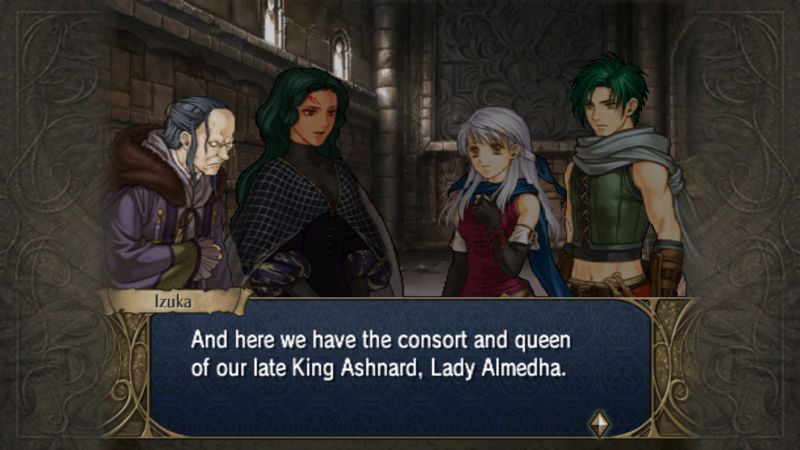
Braden: Izuka approached Almedha and brought her to Pelleas, after finding Pelleas first. He intentionally deceived her and Pelleas both. In Pelleas’ position, what reason would you have to not believe that you have a mother who loved you, after being an orphan for so long? Would you even want to believe that it wasn’t true?
I talked about the response to Izuka drugging Muarim in some comments section way back, so I’ll copy paste what I said here: “There was potential for dramatic irony (the player knowing that Izuka was behind the existence of Feral Ones while the characters didn’t), but the lack of the cast's knowledge of Izuka plays into the game's plot. No one actually knows that Izuka created Feral Ones, as he admits this in PoR in a monologue that no other character hears. The player, instead of questioning whether or not he is evil, is questioning what his motivations must be. "Who is he trying to help? What is his goal?" When you see that he and Micaiah are having disagreements, someone who has played PoR should probably start to worry about what he might do. It leaves you in suspense at the very least. Him drugging Muarim isn't really supposed to be a surprise, as he admits it almost immediately after that scene.
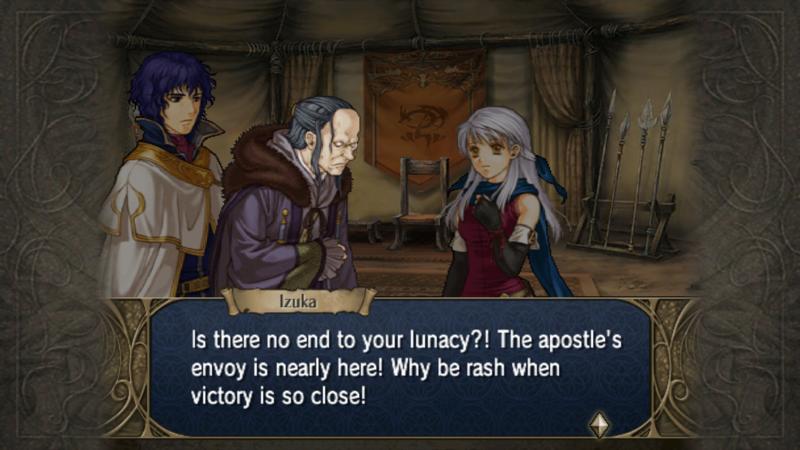
Pelleas, Micaiah and the others don't know he's evil, they just know he's pretty shady and has questionable methods. But in the position they're in, they're willing to have whatever help it takes to save Daein, even if his motivations are purely selfish. This is also why people tolerate him trying to drug Muarim. They understand that it's all of Daein at stake, not just their feelings towards Izuka being a dick. So they grin and bear it for the sake of their goal. Pelleas tries to keep the peace after the incident both out of acknowledging this and out of a sense of debt to Izuka for rescuing him from his life as an orphan. You have to look at it from his perspective: it’s only thanks to Izuka that he went from living in an orphanage to having a loving mother, to being royalty. He feels he owes him a great deal.
Pelleas trying to ask forgiveness for Izuka after what he’d done, for reference:
“Pelleas: Everybody! Wait, please! Izuka clearly did a terrible thing to that sub-hum--that laguz, I apologize. Tormod... I'm truly sorry. He will not use the drug again. So, please... Try to forgive him...
Micaiah: Prince Pelleas…”
_________________________________________________________________
Criticism:“Why do people give Corrin crap for being stupid but not Skrimir? Why does Skrimir get a pass?”
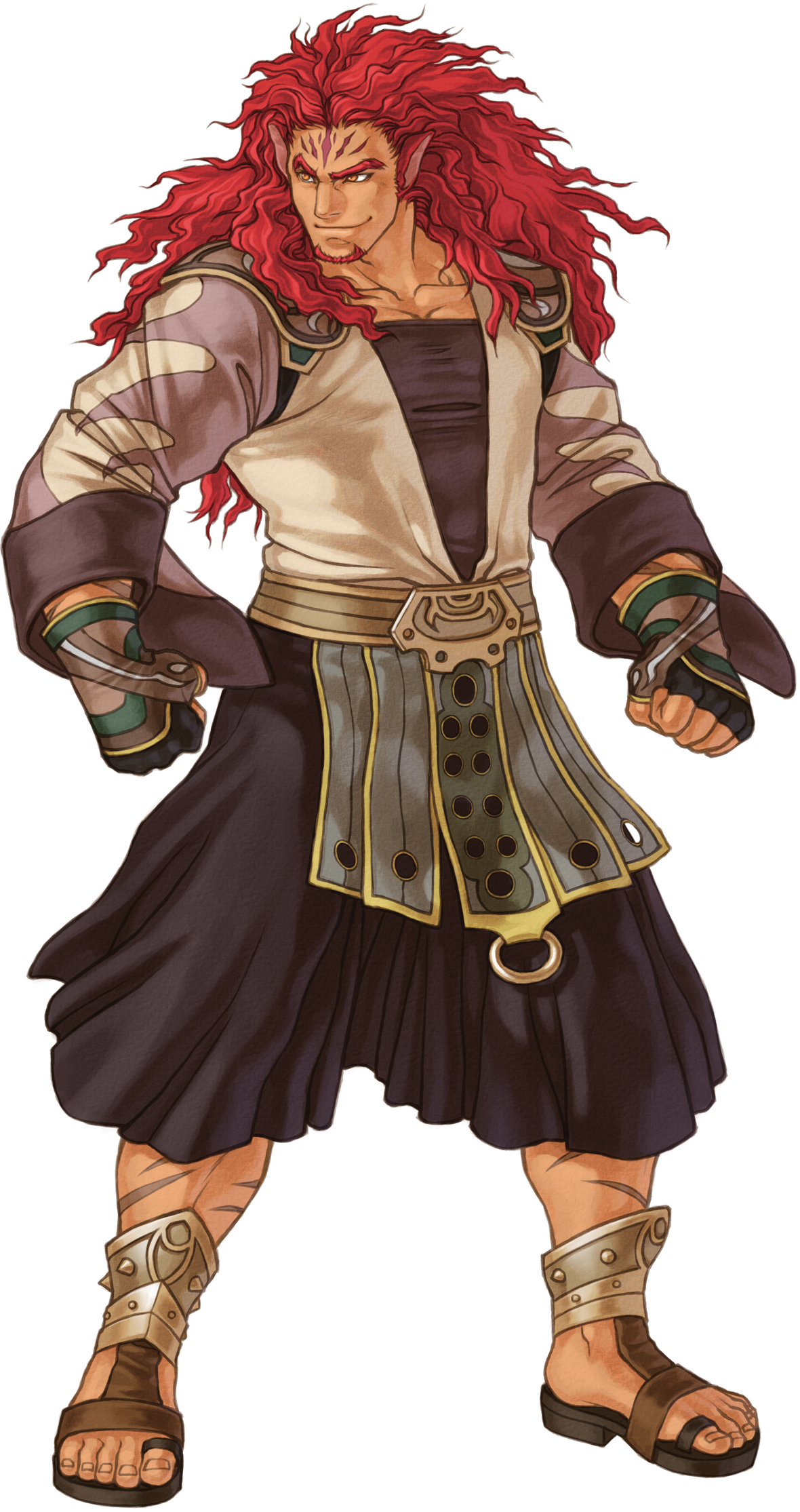
Alan: Because while Skrimir is a dummy, he’s a side-character and he gets called out by several more prominent characters in his game. Said call outs even cause him to stop being a stubborn ass while Corrin is hopelessly naive, gets told he IS hopelessly naive, but then also told that he’s charming because of it and that’s the reason everyone can trust him.
Grant: Skrimir’s flaws are treated as flaws by the narrative of his game. Corrin’s flaws aren’t. Their arcs go in completely different directions in their respective stories, which leads to different reactions among the fanbase.
When Skrimir shows up, he’s immediately called out on his bullcrap by multiple characters. Soren and Ranulf do it the most, but Ike and Titania also show their displeasure at the things he says and does. Skrimir’s flaws lead him to make a major mistake that has negative consequences. Later on in the game he learns from this and grows as a character.
Corrin, by contrast, never has this happen to them. None of their flaws are presented in a negative light. As Alan’s answer already mentioned the other characters in Fates actually think that Corrin’s naivete and stupidity are endearing. This prevents Corrin from experiencing character development. Why would you change if you don’t believe that you need to?

The presence of flawed characters does not constitute as bad writing. It’s how the narrative treats these flaws that separate the good stories from the bad ones. Skrimir’s flaws are used as a means to give him character development. Corrin’s stupidity and cluelessness are actively rewarded by the narrative of their game, which prevents them from ever needing to change.
This is one of many reasons why I find the comparison between Fates and Radiant Dawn to be entirely unwarranted. The narrative in Fates bends way over backward to prevent its precious little snowflake from being portrayed in a negative light. Radiant Dawn also has an “idiot ruler” on the side of the good guys, but that game actually gives said “idiot ruler” character development. That’s a pretty big gulf in terms of the quality of writing between the two games.
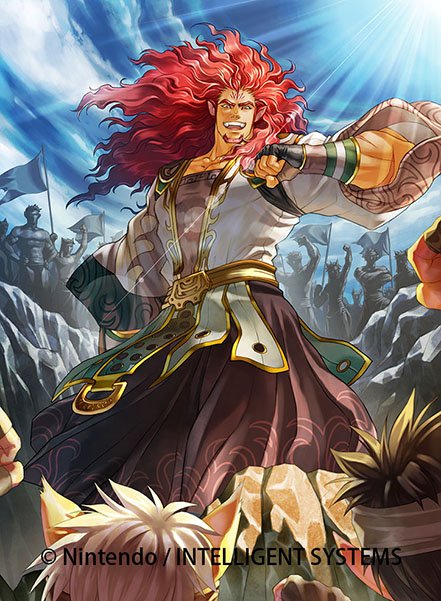
Evil Overlord Darius Pent: Because he’s not a damn vegetable that bangs the entire cast. At least Skrimir develops, and on top of that, he has actual agency and makes decisions. Awful ones. But Corrin pretty much just goes with the flow while magically keeping every enemy soldier from dying while conquering Hoshido to solve the world’s problems. Actually, that Blood Pact Catch 22 sounds like a lot more compelling an issue by comparison.
Pretty sure Skrimir never got a “free pass.” The fandom just never hated him back when RD released (that I know of) because players understood his role in the story and his contribution. Given his character growth, there was no need to spew a hatestorm about him.
But, fine. You want to criticize his idiocy. He causes all these problems! He’s intolerable! Go ahead and say it, you’re not wrong. I just don’t understand why you care that other people aren’t talking about this supporting role character and criticizing him 11 years later as much as we criticize a main character from the 2nd-most-recent game. Skrimir screwed up a major battle and immediately regretted it, and learned to adapt a little bit later. He doesn’t drive the entire story like Corrin is supposed to (while failing to actually propel any kind of narrative forward, mind you).

Braden: Guy and I were the ones who got into a comment war over this on main, the link is here: https://www.facebook.com/photo.php?fbid=10210326955553592
If you’re in main, go have a look at his comment and all the replies.
Grant: Braden linked to a Skrimir character analysis on reddit that talks about the points we covered. Here’s the link for those of you who are interested in reading it:
I also made screenshots over Braden and Guy’s comment war in the link Braden sent. They’re going to be in the next post to this one. I only took screenshots of the relevant stuff, but there were so many comments that if you want to see the full comment thread you should click on Braden’s link.
So when Corrin orders all of his men not to kill the Hoshidan soldiers in Conquest Chapter 11, if one of his guys got seriously injured because they were holding back while trying to carry out his orders, would that be a good example of punishing Corrin's flaws?
ReplyDelete